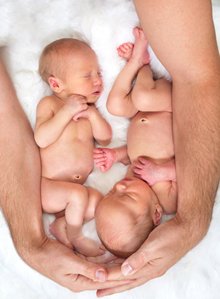There are a lot of strange phenomena when it comes to pregnancy. People speculate about all kinds of myths, like those that have to do with the moon, the ocean’s tides, certain foods or even the season affecting a woman’s pregnancy. One you might have heard revolves around twins and whether you’re more likely to have them if you conceive in the summer months. But is the claim that summer pregnancies result in more twins valid based in truth or not?
There actually is a slight tendency for twins to be conceived in the summer compared to single babies. When twins are born, pairs of boy-girl twins are slightly more likely to be born if conception occurred in the summer months, but the same can’t be said for same-sex twins. Some scientists speculate that the increased light during the summer affects the pineal gland, leading to decreased melatonin production and a reduction in the release of follicle-stimulating hormone, which makes it more likely for an egg to split or two eggs to be released.
Basically, exposure to sunlight may stimulate multiple ovulation and increase the possibility of twin gestations among mothers who are more likely to have twins. Women who have a history of twins in the family, are older when they get pregnant or are using fertility treatments to conceive are more likely to have twins in the first place.
Other factors that may influence multiple ovulation include how often you have sex, your menstrual history, the use of oral contraception, your social class and your nutrition.
Across the globe, 4 in 1,000 births result in twins. Some areas have noticeably higher or lower rates of twins due to varying factors. But if you think you might be more likely to have twins and you want to boost your chances, there’s no harm in viewing the summer months as having the best days to get pregnant.
